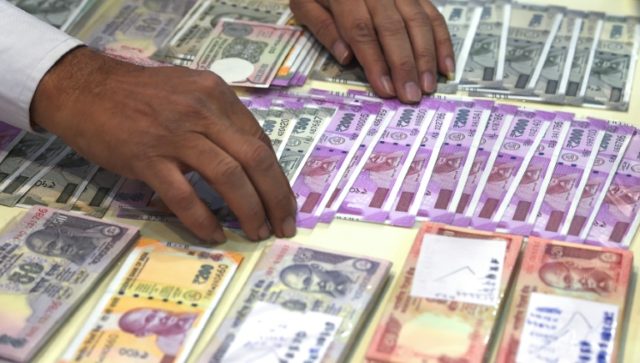Mumbai (AFP) – India’s rupee hit fresh record lows Thursday amid warnings that benefits to exporters from a weaker currency would be offset by the higher price paid by Asia’s third-largest economy for oil.
The rupee slid to 70.38 to the dollar just two days after crossing 70 for the first time as India got dragged into the turbulence of the Turkish financial crisis.
The rupee has been steadily falling throughout 2018 after starting the year at 63.67.
The weaker rupee will help India sell goods and its huge services sector in overseas markets, but the country is a massive importer of oil, securing more than two-thirds of its needs from abroad.
Any boost to exports will be offset by pressures on inflation and the current account deficit, said the Association of Mutual Funds in India.
“It is a double-edged sword for the Indian economy,” chief executive N.S. Venkatesh told AFP.
Any optimism that the falling rupee would assist exporters should be tempered with caution, said the Federation of Indian Export Organizations (FIEO).
South Africa, Argentina, Mexico, Brazil and Russia have all seen their currencies slip over the past week because, like Turkey, they remain heavily dependent on dollar-dominated foreign capital.
India’s IT, services and leather exporters may benefit from a weaker rupee — but so do its competitors from their falling currencies.
“We will lose our competitive edge to these economies and profitability from exports will also come down,” FIEO’s Ajay Sahai told AFP.
Analysts say high crude prices are squeezing the Indian currency, making it less appealing to investors.
Brent Crude was at $70.90 per barrel on Thursday, well above prices of around $50 at the same time last year.
The fall in the rupee is leading to a widening of India’s current account deficit, when the value of imports exceeds the value of exports, analysts say.
India’s central bank has raised interest rates twice this year, in part to help increase the value of the rupee.
But the currency can expect more fluctuations until the price of oil and economic conditions in emerging markets stabilise, Mumbai-based independent economist Ashutosh Datar told AFP.

COMMENTS
Please let us know if you're having issues with commenting.